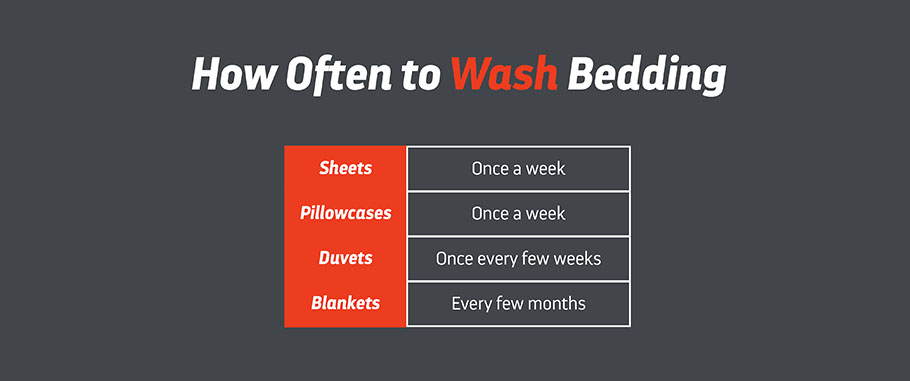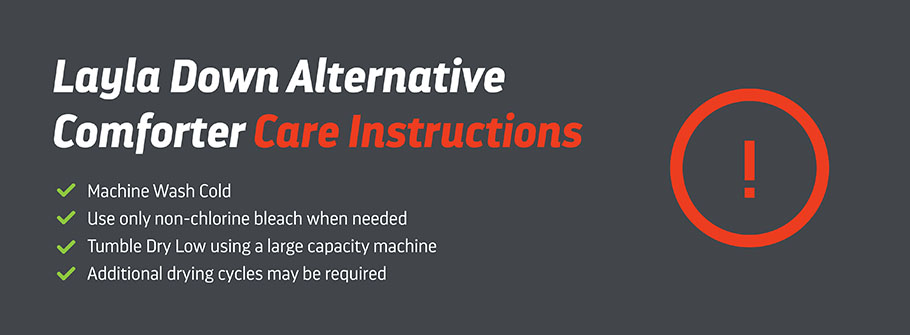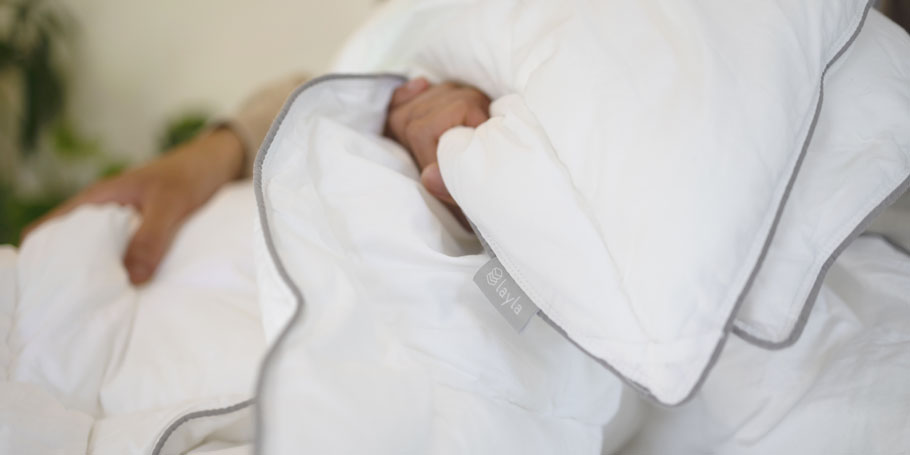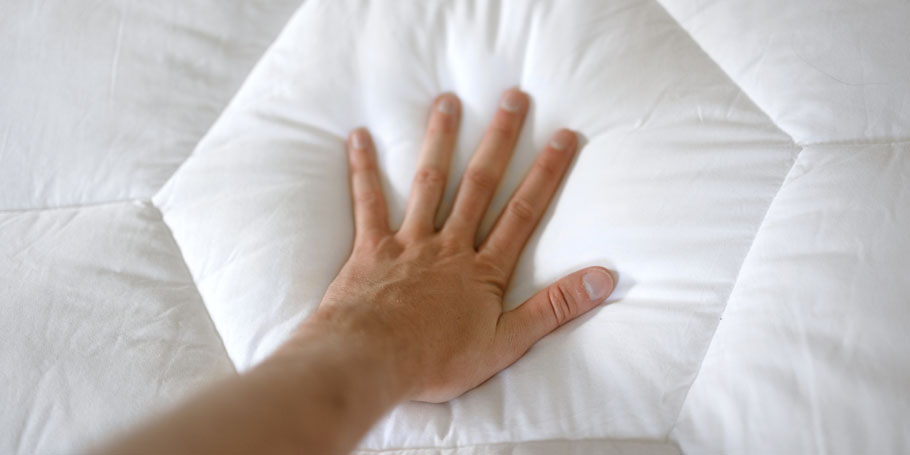- How Often to Wash Your Comforter
- What Factors Determine How Often to Wash a Comforter?
- How to Wash a Comforter
- How Often to Wash Other Types of Bedding
- The Bottom Line: How Often Should You Wash a Comforter?
How Often to Wash Your Comforter
Most comforters need to be washed monthly or every two months. If you have a duvet for your comforter, you can choose to wash the duvet more often and the comforter less often. However, you should still aim to wash your comforter a few times a year, even if it’s covered. Duvets should be washed bi-monthly to ensure that you’re sleeping in clean linens.

You already know that you sweat in your sleep, which means that your sweat might be seeping into your comforter. Not only that, but comforters can harbor allergens, including dust mites, which can make you feel sick when you’ve finally made it to bed for the night. Dirty comforters can cause all sorts of problems. While you might not wear your comforter like you wear your t-shirt, consider how often you wash the clothes that touch your body. Your comforter might have pajamas saving it from touching all of your skin, but that doesn’t mean that it’s not collecting dirt and grime.
Keeping your comforter clean can improve your sleep because you won’t have to worry about dust mites, allergens, or a suspicious smell.
Looking for the perfect comforter that’s easy to wash? Check out our comforter buying guide.
What Factors Determine How Often to Wash a Comforter?
Your comforter can get dirty in a variety of ways, such as allergens, body sweat, body oils, spills, and illness. These are all factors that can determine how often to wash your comforter.

To help you determine how often to wash your comforter, we’ve outlined a few factors that can impact your washing cycle. Take a look at how often to wash a comforter below:
- Bedding material: Delicate bedding should be dry cleaned instead of washed to ensure that you don’t accidentally ruin the comforter. For example, when it comes to down vs. down alternative comforters, you can typically wash a down alternative comforter in a washing machine but should dry clean your down comforter. What is a down comforter versus down alternative that you can’t machine wash it? Down comforters are delicate because they contain feathers, so if they’re not washed correctly, they can get ruined. Dry cleaning can also ensure that the bedding is washed correctly.
- Duvet cover: As mentioned previously, if you have a duvet, you’ll need to wash the duvet cover more frequently than you do your comforter.
- Hygiene habits: If you shower before bed, then you likely won’t be adding too much dirt and grime to your comforter every night and can get away with washing your comforter less often. However, if you sweat at night, you may have to wash your bedding more frequently. If you get hot at night and it’s affecting your ability to sleep, consider getting the best down comforter for hot sleepers.
- Illness: If you’re under the weather, consider washing your comforter more often to help keep germs away. You should also wash your sheets once you’re no longer sick so that you don’t reintroduce germs into your system.
- Sharing: If you share the comforter with a partner, you may need to wash your comforter more often. Remember, twice the people equals twice the dirt, grime, and sweat. Similarly, if you share the bed with your pet, you should wash your comforter frequently, especially if your pet is a dog. Remember, your dog’s paws have been in mud while on walks, so you don’t know what they could be bringing into bed with them.
- Spills: Eating and drinking in bed are common, but the more you eat in bed, the more likely you are to have crumbs that can attract bugs. You should also wash your comforter as soon as a spill happens to prevent a stain from setting in.
- Preference: Some people will choose to wash their comforters every week because they find the fresh scent of their laundry detergent helps them fall asleep faster. How often you wash your sheets may be a matter of preference as long as your wash schedule doesn’t impact your health or sleep quality.
How to Wash a Comforter
Now that you know how often to wash a comforter, you should know how to wash your comforter. Washing your comforter doesn’t have to be difficult, but there are some tips to help make the process easier. Comforters typically have to be washed on their own because they take up a lot of washing machine and dryer real estate. Packing in clothes with your comforter may make the load too large for the washing machine to wash the material thoroughly. Here are other tips to follow when washing your comforter:
1. Check the tag
Your comforter has a tag that will tell you how to care for it. The tag will tell you which machine and dryer settings to use to ensure that you don’t lose any quality. Unfortunately, it can also tell you that your comforter should be dry cleaned only, which means you may need to take it to a dry cleaner every so often for a deep clean and to ensure that your comforter doesn’t get ruined.
2. Use the right settings
You should always use a washing machine and dryer that’s large enough for your comforter. Some comforters might not fit in standard machines. Instead of trying to push the comforter down the machine as far as you can, you may have to take it to a laundromat or dry cleaners. Stuffing your comforter into the washing machine without giving it enough space can cause the detergent not to be able to reach all areas of the comforter, which means you won’t be cleaning the entire comforter.
3. Consider sanitizing
Some comforters shouldn’t be washed in hot water. However, if your comforter can be washed in warm or hot water, consider doing it at least monthly to sanitize it. If your comforter’s tag doesn’t say anything about warm or hot water, it’s typically best not to risk it. Instead, follow the exact instructions that you’re given.
4. Consider air drying or low heat
Dry your comforter in the air or low heat to prevent the inner materials of the comforter from clumping.
5. Take it to a dry cleaner
If you want to ensure that your comforter is clean and sanitized, consider taking it to a dry cleaner. Dry cleaners can wash your comforter correctly to ensure it doesn’t get ruined while getting washed and dried thoroughly. Many comforters, such as the Layla Down Comforter, are machine-wash safe, so you don’t need to take a trip to the dry cleaners if you don’t want to.
6. Start drying immediately
Some of us have a habit of starting the washing machine and forgetting about it until the next day. Unfortunately, this means that your comforter has been moist in a dark, enclosed space for hours, which means that it has become a breeding ground for mildew and bacteria. This is the case with any item that you wash in your machine, even a quilt vs. comforter. If you want to ensure that your comforter is as clean as it can be, move your comforter from the washing machine to the dryer as soon as it’s ready.
How Often to Wash Other Types of Bedding
Keeping your comforter clean is just one part of having a comfortable and clean bed. There are other items that you should regularly wash as well.

- Sheets: Bed Sheets should be washed once a week because they come in direct contact with the skin, collecting dead skin cells, body oils, dirt, allergens, and bacteria. If you have pets or children that sleep in bed with you, you might even want to wash your sheets more often.
- Pillowcases: Pillowcases should be washed once a week or more because they come into direct contact with your face and neck skin, which can sometimes be dirtier than the rest of your body. If you’re prone to skin problems such as acne, then try washing your pillowcase more often.
- Duvets: Duvets will keep your comforter clean and don’t need to be washed as often as your sheets or pillowcases. However, you should still wash your duvet every few weeks to get rid of dust mites and dirt.
- Blankets: Blankets can be washed every few months, especially if you don’t use them every night. If you’re not using your blankets every night, consider folding them up and putting them in a closet to keep them clean for the next time you need them.
The Bottom Line: How Often Should You Wash a Comforter?
A comforter should be washed at least every few weeks, but more so if you sweat in your sleep or sleep with a pet. If you bathe before getting into bed and don’t share your bed with anyone else, you can typically get away with washing your comforter less often. However, dust and other allergens can still build-up, so there’s no reason not to wash your comforter or get a duvet cover to ensure that you’re taking proper care of your comforter so that you can sleep better.

Layla Sleep offers both down alternative comforters and weighted blankets for sleep so you can ensure a quality night’s sleep every night. Each comes with easy-to-clean instructions, so you can have a fresh, relaxing sleep night after night.



